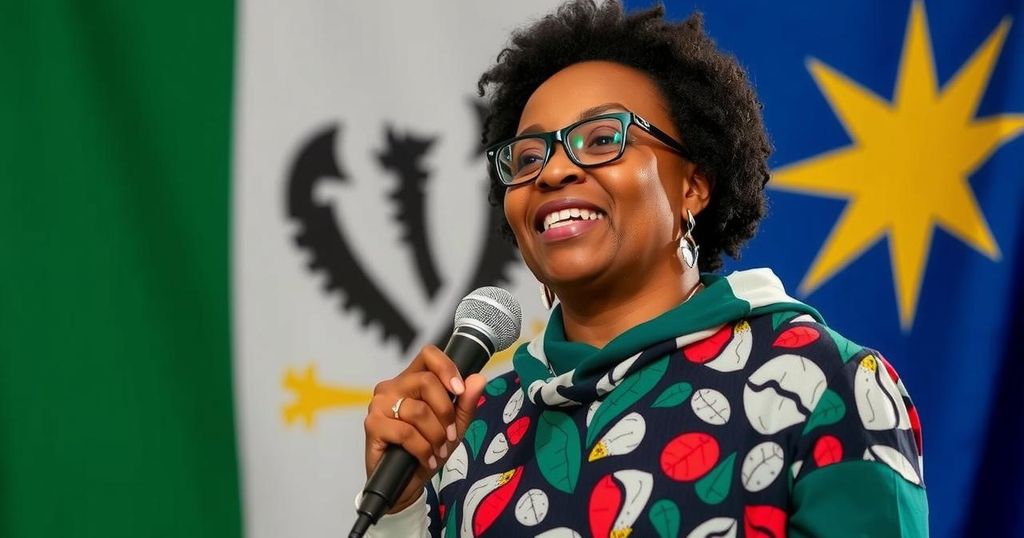Politics
AFRICA, BOTSWANA, DEMOCRACY, ELECTIONS, ELECTORAL COMMISSION OF NAMIBIA, EUROPE, GERMANY, GOVERNANCE, GOVERNMENT, HA, INDEPENDENCE MOVEMENT, INDEPENDENT PATRIOTS FOR CHANGE, NAMIBIA, NANDI - NDAITWAH, NET, PAN, PANDULENI ITULA, PARLIAMENTARY SEATS, POLITICAL DYNASTY, SOUTH AFRICA, SWAPO, VP, WINDHOEK
Jamal Walker
0 Comments
Netumbo Nandi-Ndaitwah Becomes Namibia’s First Female President
Namibia has elected its first female leader, Vice President Netumbo Nandi-Ndaitwah, who won 57% of the votes in a recent presidential election. Despite the ruling SWAPO party’s continued dominance, opposition parties are contesting the election results due to reported technical issues. Nandi-Ndaitwah’s presidency marks a significant historical moment in Namibia’s political landscape.
Namibia has made history by electing its first female leader, Vice President Netumbo Nandi-Ndaitwah, as the head of state following last week’s presidential election. Announced on Tuesday, Nandi-Ndaitwah secured 57% of the votes, surpassing initial expectations that anticipated a potential runoff. The ruling SWAPO party, which has dominantly ruled since Namibia’s independence in 1990, also retained its parliamentary majority amidst a backdrop of technical difficulties faced during the election process.
Opposition parties have raised serious concerns regarding the electoral process, particularly citing issues such as ballot paper shortages that necessitated an extension of voting. They have described this extension as illegal and have vowed to challenge the election results in court. Despite the controversies, the SWAPO party remains resolute, having avoided the declines seen by other long-standing parties in the region, such as those in South Africa and Botswana. Nandi-Ndaitwah, a noted member of the independence movement in the 1970s, will succeed the late President Hage Geingob, becoming the fifth president since the country’s independence.
The swearing-in of Netumbo Nandi-Ndaitwah marks a significant milestone for gender representation in African leadership. As the nation grapples with internal challenges, the opposition’s strong reactions following the election results underscore ongoing tensions in Namibia’s political landscape. Additionally, the Independent Patriots for Change, led by Panduleni Itula, who garnered 25% of the vote, remains poised to challenge the process legally as political contention persists.
Namibia, situated on the southwest coast of Africa, has a history steeped in the struggle for independence from apartheid South Africa, achieving sovereignty in 1990. The SWAPO party has been at the helm since then, governing the nation for over three decades. The election of Netumbo Nandi-Ndaitwah as president not only signifies a shift in leadership but also embodies a breakthrough for women in political offices within the region. However, the current election is marred by accusations of mismanagement, indicating potential challenges for the newly elected administration as it seeks to maintain legitimacy amidst opposition dissatisfaction.
In conclusion, the election of Netumbo Nandi-Ndaitwah as Namibia’s first female president represents a pivotal moment for the nation and encourages advancements in gender equity in leadership roles. However, the ongoing challenges posed by opposition parties regarding the electoral process cast a shadow over the victory, suggesting that the new administration must navigate complex political terrain as it assumes governance. The resilience and response of both the ruling party and opposition will undoubtedly shape Namibia’s political future.
Original Source: abcnews.go.com




Post Comment